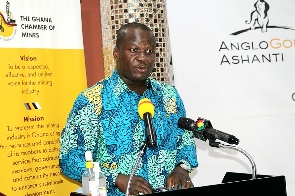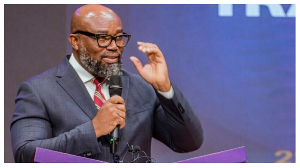Mr Benito Owusu-Bio, a Deputy Minister for Lands and Natural Resources, says the government is not so far satisfied with the results of the fight against illegal mining due to the complexities of the industry and the huge sums of money involved.
He said although the government continued to put in place the necessary measures to deal with illegal mining, popularly known as ‘Galamsey’, it ought to be noted, however, that the fight against the canker was not an event but a process.
“Mr Speaker, after decades of destruction, the results of our policies may not be immediately obvious. But we will continue to work with all stakeholders to protect our lands and forest as well as our water bodies, for current and future generations,” Mr Owusu-Bio told Parliament on Wednesday when he responded to a question on behalf of Mr Samuel Abu Jinapor, the Minister for Lands and Natural Resources.
He said this on the floor of Parliament when Dr Kingsley Nyarko, a New Patriotic Party, Member of Parliament for Kwadaso, asked him about the progress made or being made towards the fight against illegal mining in the country.
The Minister said although the small-scale mining industry contributed approximately a third of the country’s total gold production, unfortunately, its impact on the environment in recent years had sadly, become associated with environmental degradation and water pollution.
According to Mr Owusu-Bio since the beginning of last year, the government had implemented several policies and programmes aimed at coming to grips with this canker.
“Mr Speaker, we declared river bodies as red zones for mining, banned reconnaissance, prospecting and or exploration in forest reserves, launched Operation Halt II to rid river bodies and forest reserves of illegal mining activities, introduced speed boats and river guards to patrol and protect our river bodies.
“Banned the manufacture, sale and or use of the floating platform, popularly referred to as Changfan, enhanced the punishment regime for persons involved in illegal mining, revamped Community Mining Scheme and developed an Operation Manual to regulate their operations,” he said.
The minister noted that with the support of the House, under the Minerals and Mining Amendment Act, 2019 (Act 995), the government had enhanced the punishment regime and increased the punishment for people engaging in illegal mining to a minimum of 15 years imprisonment together with a fine of not less than 10, 000 penalty units for Ghanaians, and a minimum of 20 years imprisonment, together with a fine of not less than 100,000 penalty units for foreigners with the hope that those found guilty would be made to face the full rigorous of the law.
“Mr Speaker, this gamut of measures has yielded some positive results, with a surge in the number of prosecutions and convictions for persons involved in illegal mining including the famous Aisha Huang.
“Mr Speaker, let this august House be rest assured of my unflinching commitment to the fight and I continue to be grateful for the support of members, individually and collectively,” Mr Owusu-Bio said.
He said the government had retooled the Inspectorate Division of the Minerals Commission and recruited more mine inspectors to enforce mining regulations, adding that, by section 92 of the Minerals and Mining Act, 2006 (Act 703), Small Scale Mining Committees in all 83 mining districts of the country had been established to assist the District Offices of the Minerals Commissions to effectively monitor small scale mining operations.
Mr Owusu-Bio also told Parliament that as part of efforts to fight ‘Galamsey’, the government had also introduced mercury-free gold processing equipment known as Gold Katcha to prevent the use of mercury in gold processing, to fulfil obligations under the Minamata Alternative Employment and Livelihood Programme to provide alternative sources of livelihood to those engaged in illegal and unsustainable mining practices.
General News of Thursday, 24 November 2022
Source: GNA













